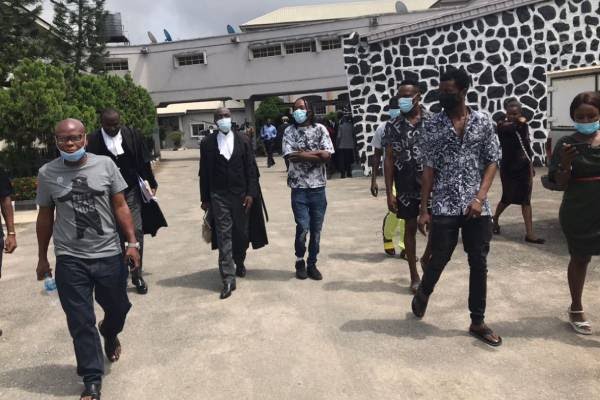Alleged Cyber Fraud: EFCC Displays 51,933-Page Analysis Of Naira Marley’s Phone

Economic and Financial Crimes Commission (EFCC) projected the exhibits, through its second witness, a forensic analyst, Augustine Anosike, who continued his evidence in the trial in the trial of the defendant, who is facing an 11 count- charge, bordering on conspiracy, possession of counterfeit credit cards as well as fraud.
Recall that the anti-graft agency preferred the charges against the ‘Am I a yahoo boy’ singer on May 14, 2019.
Read Also: EFFC Arraigns Naira Marley In Court As Trial Begins
He was then arraigned on May 20, 2019 before Justice Nicholas Oweibo, but he pleaded not guilty to the charges.
The court had accordingly, granted him bail in the sum of two million naira, with two sureties in like sum.
The trial suffered a setback at the start of the second prosecution witness’ evidence due to the covid-19 lockdown in 2020 and the judiciary workers strike.
Augustine Anosike had earlier stated on Tuesday how different text messages and chats containing credit card details, were exchanged between the defendant, and someone named Yadd.
Read Also: Nigeria Artiste Naira Marley Opposes EFCC Over Phone Content
He told the court that from the iPhone analysed, they discovered a total of 977 Short Message Service (SMS) and 1433 chat messages, adding that there were also seven pending status update messages.
The court had also granted the prosecution leave to display a CD in a projector containing the full analysis of Naira Marley’s iPhone, in order to discharge its burden of proof as required by law.
On Wednesday, the witness showed visual displays of the credit card numbers, chats, as well as the incoming and outgoing short message services (SMS), which were analysed from the defendant’s iPhone.
The prosecutor, Rotimi Oyedepo had told the court at the last adjourned date, that the prosecution only printed out hard copies of relevant portions of the exhibit, which it considered key to its case.
Read Also: Alleged Internet Fraud: Court Adjourns Naira Marley’s Trial Till October 5
He told the court that the CD which was displayed for about 45 minutes contained a total of 51,933 pages of the analysis conducted on the defendant device.
During cross examination, defence counsel Mr Olalekan Ojo (SAN), first sought leave of court to apply for a variation of its order, asking the judge to take custody of the iPhone of the defendant which had been in custody of the prosecution.
According to him, Federal High Court is well capable of keeping the exhibits in its custody, adding that it would also create ease for defence to apply for the exhibits if needed. The court noted the requested.
Fielding questions from the defense counsel, the witness confirmed to the court that he had confined his analysis within the compass of his forensic reports.
When defence counsel asked the witness to confirm if his analysis had also covered possible number of persons that had used the said iPhone of the defendant, the witness replied that the number of persons were not ascertained.
He told the court that the defendant provided the password to the investigating operatives who consequently, transmitted same to him for his analysis.
When asked to confirm if there is a difference between the owner and user of a device, the witness answered “The names on a phone can be changed depending on what the owner chooses to use”.
Defence then asked the witness to show to the court from the two pages of his analysis summary, where he had indicated that there was a change of names in the device.
The witness replied that although it was not captured, the content of his report also reflects the content of the device as recovered therein.
Justice Oweibo adjourned trial until Nov. 30, Dec. 13, and Dec. 14.
According to EFCC, the defendant committed the offences on different dates between November 26, 2018 and December 11, 2018, as well as May 10, 2019.
The commission alleged that Fashola and his accomplices conspired to use different Access Bank ATM cards to defraud their victims.
It alleged that the defendant used a bank credit card issued to another person, in a bid to obtain fraudulent financial gains.
EFCC also said that the defendant possessed counterfeit credit cards belonging to different people, with intent to defraud which amounted to theft.
The alleged offences contravene the provisions of Sections 1 23 (1) (b), 27 (1) and 33(9) of Cyber Crime (Prohibition) Prevention Act, 2015.
